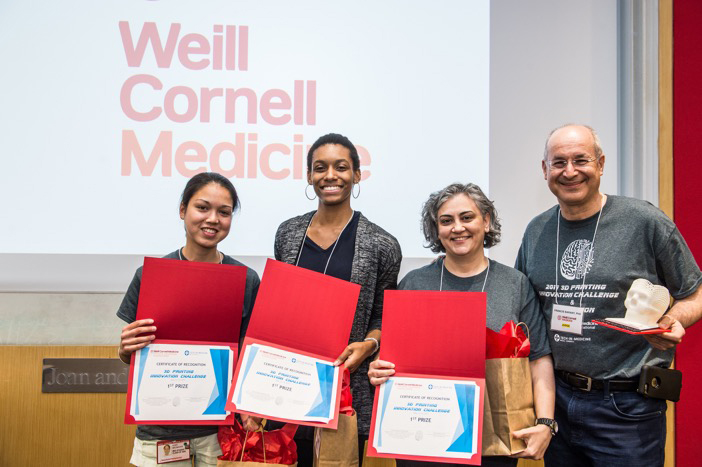WCM hackathon focuses on 3-D printing innovation
By Jamie Kass

The Clinical and Translational Science Center (CTSC), in collaboration with the medical student group Tech-in-Medicine, hosted its first hackathon, the 3-D Printing Innovation Challenge, over the course of several days in May. While 3-D printing is not a new technology, the biomedical field has been slow to embrace it in research and clinical applications, in part due to a lack of awareness of its availability and capabilities.
To jump-start its adoption, staff at the CTSC cast a wide net for participants in the Innovation Challenge and solicited ideas for projects from departments across WCM. They also engaged design and 3-D printing professionals at WCM and beyond to lend their expertise to the faculty, medical students, researchers, fellows and others who signed up for the hackathon.
Some people registered as a team with a project proposal; others were organized into groups based on their interests and expertise. Projects ran the spectrum from basic research tools like a 3-D cell culture apparatus to consumer products such as orthotics and pill cases.
On the eve of the hackathon, Dr. Julianne Imperato-McGinley, CTSC director and principal investigator, opened the proceedings by stressing the importance of creativity and disruptive thinking, as well as the need to break down silos, in order to make transformative advances in medicine. Rob Shepherd, assistant professor of mechanical and aerospace engineering at Cornell’s Ithaca campus and an expert in 3-D printing with soft, biocompatible materials, and Dr. James Shin, a fellow in Weill Cornell Medicine’s Department of Radiology and an expert in clinical 3-D printing, gave inspiring talks on the current uses and future potential for 3-D printing in biomedicine.
The weekend of May 13-14 was dedicated to working on the projects, and committed teams worked feverishly in the CTSC 3-D Printing Lab with CTSC research specialist Andrika Morant right up until their final presentations the following week. Though billed as a competition, there was a free-flowing exchange of knowledge among teams, which reinforced the overarching educational goals of the hackathon.
The winning group, which focused on designing affordable and customizable orthotics, was led by Cornell graduate student Val Denay Mack, along with Hospital for Special Surgery occupational therapist Eugenia Papadopoulos, WCM medical student Aoife MacMahon and Cornell graduate student Jingyang Liu. The first-prize package included a specially designed 3-D printed skull trophy, an Arduino electronics kit and an Echo Dot for each member of the team. Finalists received Certificates of Recognition in the following categories: Most Innovative Product, Most Integrative Product, Best Prototype and Most Personalized Product.
In addition to Shin, Drs. Francis Barany, Anthony Brown, Michele Fuortes, Mark Pecker, Henning Voss and Noy Bassik volunteered as mentors and judges for the event. Drs. Ryan Schreiner, Rob Shepherd, Sanlin Robinson, Jonathan St. George, Alejandro Amor-Coarasa and Elizabeth Henaff, as well as WCM librarian Loretta Merlo, medical student Du Cheng, 3-D designer Kate Specter, and founder of OomStudios Yevgeny Koramblyum assisted teams during the hackathon.
The 3-D printed final products will be on display in the Samuel J. Wood Library at Weill Cornell Medicine during the month of June.
To learn more about the 3-D Printing Innovation Challenge and Hackathon, including future events, contact My Linh Novotny, assistant director of program development at the CTSC, and Birra Taha and Pavan Myneni, Tech-in-Medicine student leaders, at 3dprintinghackathon@med.cornell.edu.
Jamie Kass is a science writer for Weill Cornell Medicine.
Media Contact
Get Cornell news delivered right to your inbox.
Subscribe